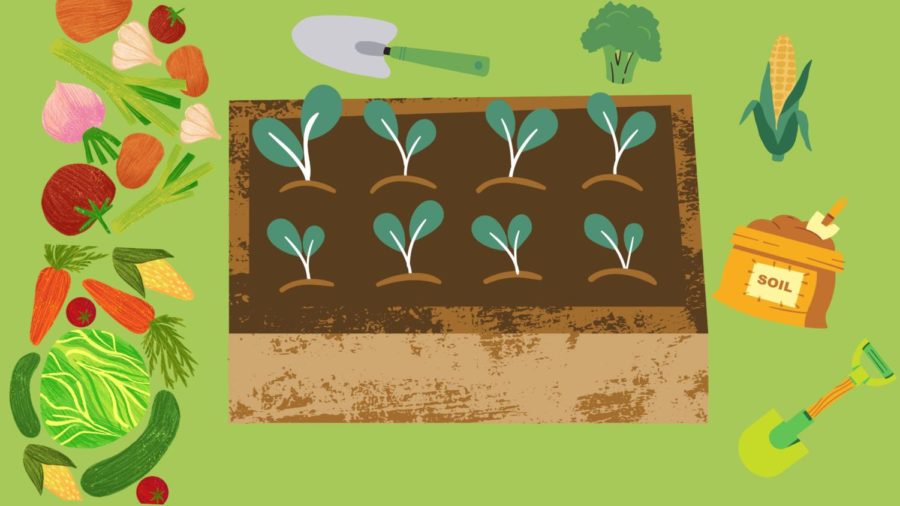Pardon My Garden
Illustrated by Kailey Pallares
As the weather warms up and spring quickly approaches, students are looking for fun activities to do during these sunny months. Many students play outdoor sports during Spring and the Summer months, but one of the most mentally stimulating ways to spend time outdoors is beginning your own garden. Growing and taking care of plants can be enriching, and can teach patience and dedication. Finding the perfect time, place, and plants to grow is important knowledge to have prior to starting your garden to ensure it will survive.
First, it is important to consider which plants are best for your experience level. Success in gardening is all about putting the right plant, in the right place, at the right time. That starts with understanding of the crops suited to your region and the season in which to plant them. In Missouri, our climate zone is a seasonal humid subtropical climate, and it’s important to familiarize yourself with the fruits, vegetables, flowers, and herbs that thrive in it. Once you know your climate zone, look up the duration of your growing season. Now, when you go to your local garden center, you can look for plants corresponding to your experience level. If you are buying seeds, compare the number of “days to maturity” on the seed packet to the length of your growing season. You can always use page 23 in our recent Central Focus issue to find a plant best fit for your skill level.
When you’re starting a garden from scratch, it’s the perfect time to pick out the best possible location! Most fruits and vegetables need full sun, with a minimum of five hours of direct sunlight per day for fruiting. Greens, herbs and vegetables will grow in partial shade. Think about how you will access the garden for picking, watering, and caring for your plants. Neglecting or forgetting your garden will result in all of your hard work being for nothing! Avoid high wind areas and frost pockets.
Watch out for wildlife, and especially any pets you might have who will eat your garden! This can be very difficult for new seedlings. The deer and wild bunnies come to visit gardens every so often, so you should plan accordingly. If you’re a pet owner, watch out for toxic plants that they could easily get into! Here is a list of common plants you should ultimately avoid if you’re a pet owner: Lilies, Tulips, Oleander, Aloe plants, and Hyacinths! These are all highly toxic to our 4 legged best friends, and you should only plant them if they are high out of reach from your pet.
Now that we’ve gone over the steps to start your garden, it’s time to start planting! Creating beds for your garden is going to be your first move. Start small, and make sure to give each plant enough room to grow. The seeds are tiny, but full-grown plants can get huge in size, and overcrowded plants have difficulty surviving. A small, cared for garden can produce as much or more than a large, poorly tended garden. The soil being used in your garden can make or break your plants. Knowing if your soil is acidic, alkaline or neutral pH is important. Do you have sand, clay, silt, or rocks? Does it have a good amount of basic nutrients? These are important questions to ask.
Lastly, maintaining care for your garden is your most important step! Getting specific information for your garden, such as how often to water it or whether it does better in dark or light spaces. If you ever have a question about your garden, a simple google will show many other gardeners who can help you fix any problems you might face. Be patient and watch your garden prosper.
Your donation will support the student journalists of Francis Howell Central High School. Your contribution will allow us to purchase equipment and cover our annual website hosting costs. FHCToday.com and our subsequent publications are dedicated to the students by the students. We hope you consider donating to allow us to continue our mission of a connected and well-informed student body.




